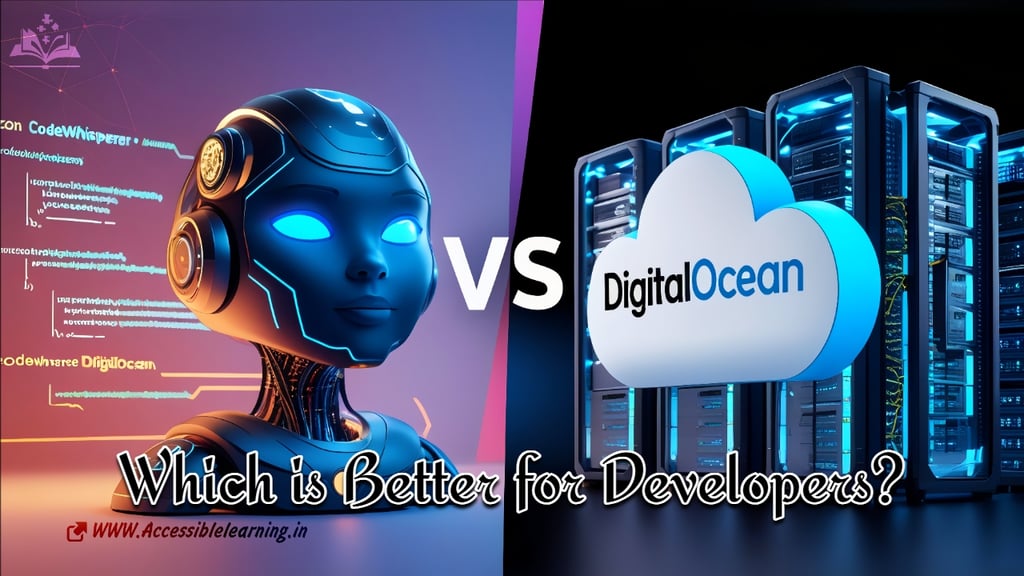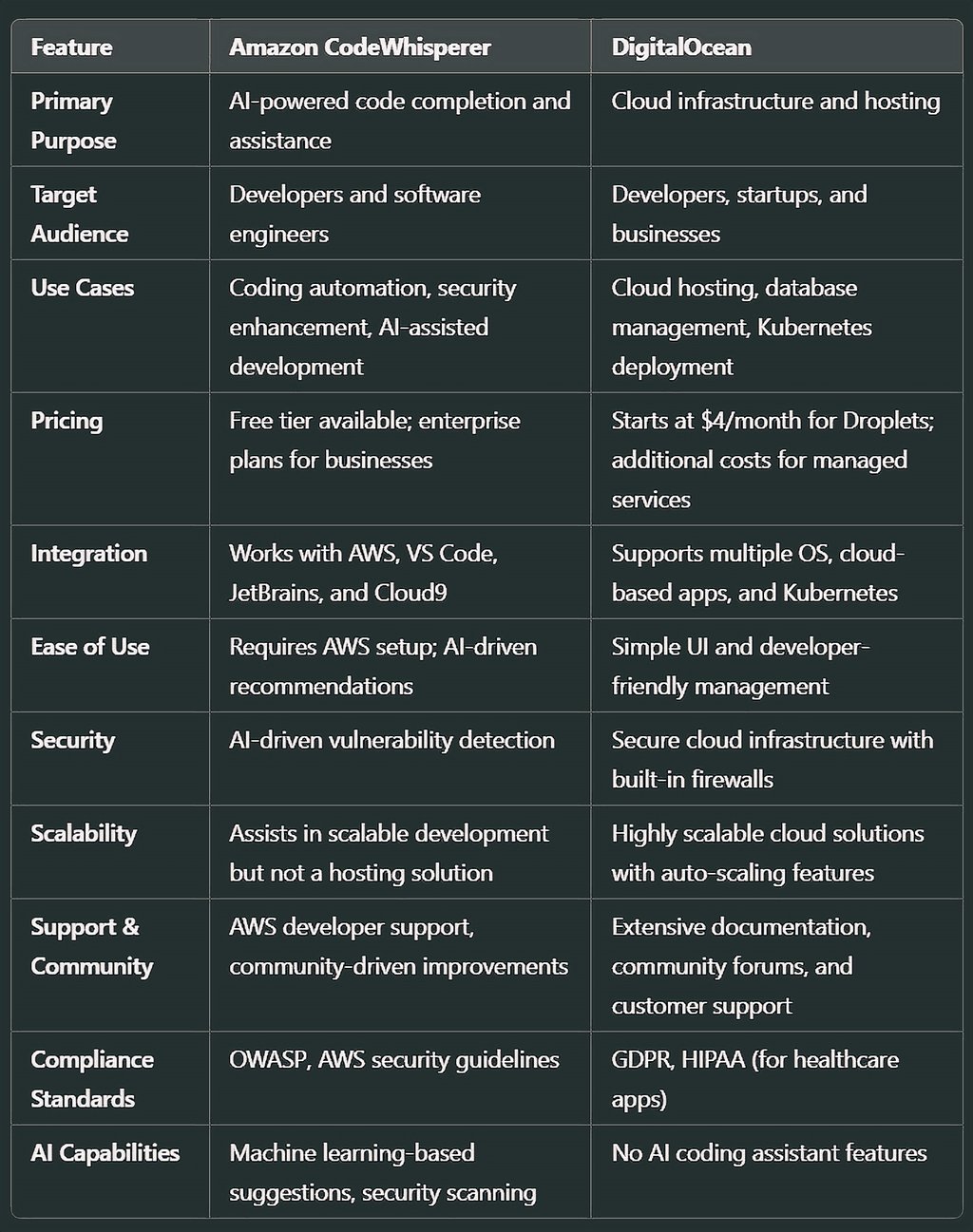
CodeWhisperer vs. DigitalOcean: Features, Use Cases, and Key Differences
Discover the key differences between Amazon CodeWhisperer and DigitalOcean in this in-depth comparison. Learn about their features, use cases, advantages, and technical details to determine which tool best suits your development and cloud hosting needs.
AI/FUTUREPROGRAMMINGEDUCATION/KNOWLEDGEEDITOR/TOOLS
Sachin K Chaurasiya
2/12/20255 min read


As the tech industry evolves, developers and businesses constantly seek tools that streamline coding and cloud management. Two popular solutions, Amazon CodeWhisperer and DigitalOcean, cater to different aspects of software development. CodeWhisperer, an AI-powered coding assistant by Amazon, focuses on enhancing coding productivity, while DigitalOcean provides cloud computing services tailored for developers and small to mid-sized businesses.
This article dives into a detailed comparison between Amazon CodeWhisperer and DigitalOcean, highlighting their features, use cases, pros, cons, and suitability for different users.
What is Amazon CodeWhisperer?
Amazon CodeWhisperer is an AI-powered coding assistant developed by AWS (Amazon Web Services). It is designed to help developers write code faster and with higher accuracy by providing real-time code suggestions, autocompletions, and context-aware recommendations.
Key Features
AI-Powered Code Suggestions: Provides real-time, context-aware code completions.
Support for Multiple Languages: Works with Python, Java, JavaScript, C++, TypeScript, and other programming languages.
Security Features: Identifies security vulnerabilities in the code and suggests fixes.
Integration with IDEs: Compatible with popular IDEs like VS Code, JetBrains, and AWS Cloud9.
AWS Service Recommendations: Suggests best practices and AWS-specific integrations, such as AWS Lambda, S3, and DynamoDB.
Productivity Boost: Reduces repetitive coding tasks and improves efficiency.
Machine Learning-Based Context Understanding: Recognizes project context to offer more relevant suggestions.
Automatic Documentation: Helps generate inline comments and explanations for better code readability.
Team Collaboration Support: Useful for development teams with shared coding standards.
Compliance & Security Standards: Ensures compliance with industry security standards such as OWASP.
Technical Capabilities
Trained on Large Codebases: Uses machine learning trained on open-source and proprietary codebases.
Works with Local and Cloud-Based Development: Supports both local development environments and cloud-based workflows.
AI-Powered Code Refactoring: Helps refactor existing code for improved efficiency and readability.
Enterprise Security & Monitoring: Offers security scanning and compliance monitoring for enterprise users.
✅ Strengths
AI-Powered Code Assistance—Provides real-time, context-aware code suggestions.
Improves Developer Productivity—Reduces repetitive tasks and speeds up coding.
Multi-Language Support—Works with Python, Java, JavaScript, and more.
Security Features—Detects vulnerabilities and offers secure coding suggestions.
Seamless IDE Integration—Compatible with VS Code, JetBrains, and AWS Cloud9.
AWS-Specific Optimizations—Provides AWS-related recommendations for developers working in the AWS ecosystem.
❌ Weaknesses
Limited to Code Assistance—Does not provide cloud hosting or infrastructure management.
Requires AWS Setup—Works best with AWS services, which may not be ideal for non-AWS users.
Not a Full IDE Replacement—Complements coding but does not replace the need for skilled developers.
Potential Bias Towards AWS—Code suggestions might favor AWS-specific solutions, limiting multi-cloud flexibility.
Use Cases
✅ AI-Assisted Software Development
Developers can use CodeWhisperer to receive real-time AI-driven code suggestions, improving efficiency and reducing coding errors.
✅ Secure Coding and Vulnerability Detection
It helps developers identify security flaws in their code, making it useful for industries with high security concerns like finance, healthcare, and e-commerce.
✅ AWS-Specific Development
Ideal for developers working within the AWS ecosystem, as it offers optimized suggestions for AWS services like Lambda, DynamoDB, and S3.
✅ Rapid Prototyping
Developers working on prototypes and MVPs can accelerate development by leveraging AI-generated code snippets and autocompletions.
✅ Learning and Onboarding
Useful for junior developers or those learning new programming languages, as it offers contextual suggestions and explanations for better understanding.
✅ Team Collaboration and Standardization
Helps maintain coding standards across teams by providing uniform, optimized code suggestions.


What is DigitalOcean?
DigitalOcean is a cloud infrastructure provider that offers simple and scalable cloud solutions. It is popular among developers, startups, and small businesses for hosting applications, managing databases, and deploying virtual machines (Droplets) with ease.
Key Features
Cloud Compute (Droplets): Virtual private servers for hosting applications.
Managed Databases: Supports PostgreSQL, MySQL, Redis, and MongoDB.
Kubernetes: Managed Kubernetes for containerized applications.
Simple User Interface: Developer-friendly UI and API-driven infrastructure.
Affordable Pricing: Budget-friendly cloud services compared to AWS and Google Cloud.
Scalability: Easily scale applications with load balancing and auto-scaling.
Block Storage and Object Storage: Secure and flexible storage solutions.
Networking Solutions: Load balancers, VPCs, floating IPs, and private networking for cloud efficiency.
Marketplace for 1-Click Apps: Deploy popular applications like WordPress, Docker, and LAMP stack with ease.
99.99% Uptime Guarantee: Ensures high availability of applications.
Technical Capabilities
Global Data Centers: DigitalOcean has multiple data centers across the globe for lower latency.
API-First Infrastructure: Automate cloud management using RESTful API.
Cloud Firewall & DDoS Protection: Ensures enhanced security for cloud applications.
Container Registry: Easily store and manage Docker images.
Terraform Support: Infrastructure as code (IaC) support for cloud provisioning.
Managed App Platform: Supports no-code/low-code app deployment.
✅ Strengths
Developer-Friendly Cloud Hosting—Easy-to-use cloud infrastructure with a simple UI.
Affordable Pricing—Budget-friendly compared to AWS, Azure, and Google Cloud.
Scalability—Supports growing applications with flexible resources.
Managed Databases & Kubernetes—Pre-configured solutions for developers.
Reliable Performance—99.99% uptime guarantee and robust networking options.
One-Click Deployments—Marketplace offers easy installation of apps like WordPress, Docker, and more.
❌ Weaknesses
Not AI-Powered—Does not provide AI-driven coding assistance like CodeWhisperer.
Fewer Advanced Cloud Features—Lacks some of the enterprise-grade capabilities of AWS, Azure, and Google Cloud.
Limited Ecosystem—Not as extensive as AWS, making it less ideal for highly complex architectures.
Manual Configuration Needed—While easy to use, developers still need to configure security and scalability manually.
Use Cases
✅ Cloud Hosting for Startups and Small Businesses
Startups and developers use DigitalOcean to deploy and manage cloud applications due to its simplicity and cost-effectiveness.
✅ Scalable Web Application Deployment
DigitalOcean’s cloud infrastructure supports growing applications with easy scalability, making it ideal for web apps, SaaS platforms, and e-commerce sites.
✅ Managed Databases and Kubernetes
Businesses running databases (PostgreSQL, MySQL) and containerized applications use DigitalOcean’s managed services for easier maintenance.
✅ One-Click App Deployment
Developers can quickly launch pre-configured apps like WordPress, the LAMP stack, Docker, and Node.js from the DigitalOcean Marketplace.
✅ API-Driven Cloud Automation
DigitalOcean’s robust API allows developers to automate infrastructure management, improving efficiency in DevOps workflows.
✅ Cost-Effective Alternative to AWS and Google Cloud
Companies looking for an affordable, easy-to-use cloud provider often choose DigitalOcean instead of complex enterprise-grade cloud solutions.


When to Choose Amazon CodeWhisperer
If you are a developer looking to enhance coding productivity.
If you work extensively with AWS services.
If you need AI-powered security checks for your code.
If you use IDEs like VS Code, JetBrains, or Cloud9 and need real-time code suggestions.
If you want machine-learning-driven assistance for writing and understanding code.
If you need compliance and security vulnerability detection integrated into your coding environment.
When to Choose DigitalOcean
If you need affordable and scalable cloud hosting.
If you are a startup or small business looking for cost-effective cloud solutions.
If you require managed databases and Kubernetes support.
If you prefer a simple and intuitive cloud management interface.
If you need pre-configured cloud solutions through their marketplace.
If you are looking for global cloud deployment with flexible networking solutions.
While Amazon CodeWhisperer and DigitalOcean serve distinct purposes, both are valuable tools in the tech ecosystem. CodeWhisperer is ideal for developers who want to improve coding efficiency, while DigitalOcean excels in cloud hosting and infrastructure solutions.
For a seamless coding and deployment experience, developers can use CodeWhisperer for AI-assisted coding and DigitalOcean for scalable cloud hosting—a combination that bridges software development and cloud deployment effectively.
Additionally, as both platforms evolve, they continue to refine their services, making it easier for developers and businesses to streamline workflows and focus on innovation rather than infrastructure and repetitive coding tasks.
Subscribe To Our Newsletter
All © Copyright reserved by Accessible-Learning Hub
| Terms & Conditions
Knowledge is power. Learn with Us. 📚


